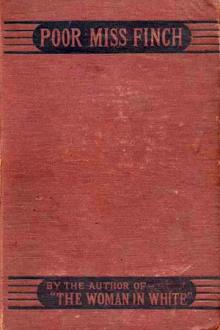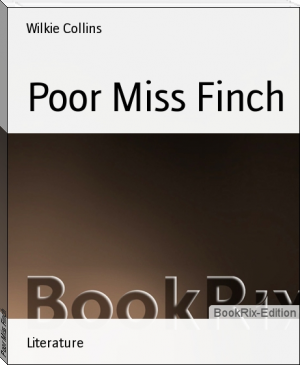Poor Miss Finch - Wilkie Collins (best books to read for beginners txt) 📗

- Author: Wilkie Collins
- Performer: -
Book online «Poor Miss Finch - Wilkie Collins (best books to read for beginners txt) 📗». Author Wilkie Collins
“Don’t blame me; don’t grieve for me. Read the rest. I want you to think of this with my thoughts—to feel about it as I feel at this moment.
“Bearing in mind what Nugent has confessed, and what I have myself seen, have I any right to hold Lucilla to her engagement? I am firmly persuaded that I have no right. After inspiring her with terror and disgust at the moment when her eyes first looked at me; after seeing her innocently happy in Nugent’s arms—how, in God’s name, can I claim her as mine? Our marriage has become an impossibility. For her own sake, I cannot, I dare not, appeal to our engagement. The wreck of my happiness is nothing. The wreck of her happiness would be a crime. I absolve her from her engagement. She is free.
“There is my duty towards Lucilla—as I see it.
“As to Nugent next. I owe it entirely to my brother (at the time of the Trial) that the honor of our family has been saved, and that I have escaped a shameful death on the scaffold. Is there any limit to the obligation that he has laid on me, after doing me such a service as this? There is no limit. The man who loves Lucilla and the brother who has saved my life are one. I am bound to leave him free—I do leave him free—to win Lucilla by open and loyal means, if he can. As soon as Herr Grosse considers that she is fit to bear the disclosure, let her be told of the error into which she has fallen (through my fault)—let her read these lines, purposely written to meet her eye as well as yours—and let my brother tell her afterwards what has passed tonight in this house between himself and me. She loves him now, believing him to be Oscar. Will she love him still, after she has learnt to know him under his own name? The answer to that question rests with Time. If it is an answer in Nugent’s favor, I have already arranged to set aside from my income a sufficient yearly sum to place my brother in a position to begin his married life. I wish to leave his genius free to assert itself, untrammeled by pecuniary cares. Possessing, as I do, far more than enough for my own simple wants, I can dedicate my spare money to no better and nobler use than this.
“There is my duty towards Nugent—as I see it.
“What I have decided on you now know. What I have done can be told in two words. I have left Browndown for ever. I have gone, to live or die (as God pleases) under the blow that has fallen on me, far away from you all.
“Perhaps, when years have passed, and when their children are growing up round them, I may see Lucilla again, and may take as the hand of my sister, the hand of the beloved woman who might once have been my wife. This may happen, if I live. If I die, you will none of you know it. My death shall not cast its shadow of sadness on their lives. Forgive me and forget me; and keep, as I keep, that first and noblest of all mortal hopes—the hope of the life to come.
“I enclose, when there is need for you to write to me, the address of my bankers in London. They will have their instructions. If you love me, if you pity me, abstain from attempting to shake my resolution. You may distress me—but you will never change me. Wait to write, until Nugent has had the opportunity of pleading his own cause, and Lucilla has decided on her future life.
“Once more, I thank you for the kindness which has borne with my weaknesses and my follies. God bless you—and goodbye.
“OSCAR.
Of the effect which the first reading of this letter produced on me, I shall say nothing. Even at this distance of time, I shrink from reviving the memory of what I suffered, alone in my room on that miserable night. Let it be enough if I tell you briefly at what decision I arrived.
I determined on doing two things. First, on going to London by the earliest train the next morning, and finding my way to Oscar by means of his bankers. Secondly, on preventing the villain who had accepted the sacrifice of his brother’s happiness from entering the rectory in my absence.
The one comfort I had, that night, was in feeling that, on these two points, my mind was made up. There was a stimulant in my sense of my own resolution which strengthened me to make my excuses to Lucilla, without betraying the grief that tortured me when I found myself in her presence again. Before I went to my bed, I had left her quiet and happy; I had arranged with Herr Grosse that he was still to keep his excitable patient secluded from visitors all through the next day; and I had secured as an ally to help me in preventing Nugent from entering the house, no less a person than Reverend Finch himself. I saw him in his study overnight, and told him all that had happened; keeping one circumstance only concealed—namely, Oscar’s insane determination to share his fortune with his infamous brother. I purposely led the rector to suppose that Oscar had left Lucilla free to receive the addresses of a man who had dissipated his fortune to the last farthing. Mr. Finch’s harangue when this prospect was brought within his range of contemplation, was something to be remembered, but not (on this occasion) to be reported—in mercy to the Church.
By the train of the next morning, I left for London.
By the train of the same evening, I returned alone to Dimchurch; having completely failed to achieve the purpose which taken me to the metropolis.
Oscar had appeared at the bank as soon as the doors were opened in the morning; had drawn out some hundreds of pounds in circular notes; had told the bankers that they should be furnished with an address at which they could write to him, in due course of time; and had departed for the Continent, without leaving a trace behind him.
I spent the day in making what arrangements I could for discovering him by the usual methods of inquiry pursued in such cases; and took the return train to the country, with my mind alternating between despair when I thought of Lucilla, and anger when I thought of the twin-brothers. In the first bitterness of my disappointment, I was quite as indignant with Oscar as with Nugent. With all my heart I cursed the day which had brought the one and the other to Dimchurch.
As we lengthened our distance from London, flying smoothly the tranquil woods and fields, my mind, with time to help it, began to recover its balance. Little by little, the unexpected revelation of firmness and decision in Oscar’s conduct—heartily as I still deplored and blamed that conduct—began to have a new effect on my mind. I now looked back in amazement and self-reproach, at my own superficial estimate of the characters of the twin-brothers.
Thinking it over uninterruptedly, with no one in the carriage but myself, I arrived at a conclusion which strongly influenced my conduct in guiding Lucilla through the troubles and perils that were still to come.
Our physical constitutions have, as I take it, more to do with the actions which determine other people’s opinions of us (as well as with the course of our own lives) than we generally suppose. A man with delicately-strung nerves says and does things which often lead us to think more meanly of him than he deserves. It is his great misfortune constantly to present himself at his worst. On the other hand, a man provided with nerves vigorously constituted, is provided also with a constitutional health and hardihood which express themselves brightly in his manners, and which lead to a mistaken impression that his nature is what it appears to be on the surface. Having good health, he has good spirits. Having good spirits, he wins as an agreeable companion on the persons with whom he comes in contact—although he may be hiding all the while, under an outer covering which is physically wholesome, an inner nature which is morally diseased. In the last of these typical men, I saw reflected—Nugent. In the first—Oscar. All that was feeblest and poorest in Oscar’s nature had shown itself on the surface in past times, to the concealment of its stronger and its nobler side. There had been something hidden in this supersensitive man, who had shrunk under all the small trials of his life in our village, which had proved firm enough, when the greatness of the need called on it, to sustain the terrible disaster that had fallen on him. The nearer I got to the end of my journey, the more certain I felt that I was only now learning (bitterly as he had disappointed me) to estimate Oscar’s character at its true value. Inspired by this conviction, I began already to face our hopeless prospects boldly. As long as I had life and strength to help her, I determined that Lucilla should not lose the man, whose best qualities I had failed to discover until he had made up his mind to turn his back on her for ever.
When I reached the rectory, I was informed that Mr. Finch wished to speak to me. My anxiety about Lucilla made me unwilling to submit to any delay in seeing her. I sent a message, informing the rector that I would be with him in a few minutes—and ran upstairs into Lucilla’s room.
“Has it been a very long day, my dear?” I asked, when our first greetings were over.
“It has been a delightful day,” she answered joyously. “Grosse took me out for a walk, before he went back to London. Can you guess where our walk led us?”
A chilly sense of misgiving seized me. I drew back from her. I looked at her lovely face without the slightest admiration of it—worse still, with downright distrust of it.
“Where did you go?” I asked.
“To Browndown, of course!”
An exclamation escaped me—(“Infamous Grosse!” spit out between my teeth in my own language). I could not help it. I should have died if I had repressed it—I was in such a rage.
Lucilla laughed. “There! there! It was my fault; I insisted on speaking to Oscar. As soon as I had my own way, I behaved perfectly. I never asked to have the bandage taken off; I was satisfied with only speaking to him. Dear old Grosse—he isn’t half as hard on me as you and my father—was with us, all the time. It has done me so much good. Don’t be sulky about it, you darling Pratolungo! My ‘surgeon optic’ sanctions my imprudence. I won’t ask you to go with me to Browndown tomorrow; Oscar is coming to return my visit.”
Those last words decided me. I had had a weary time of it since the morning; but (for me) the day was not at an end yet. I said to myself, “I will have it out with Mr. Nugent Dubourg, before I go to my bed tonight!”
“Can you spare me for a little while?” I asked. “I must go to the other side of





Comments (0)